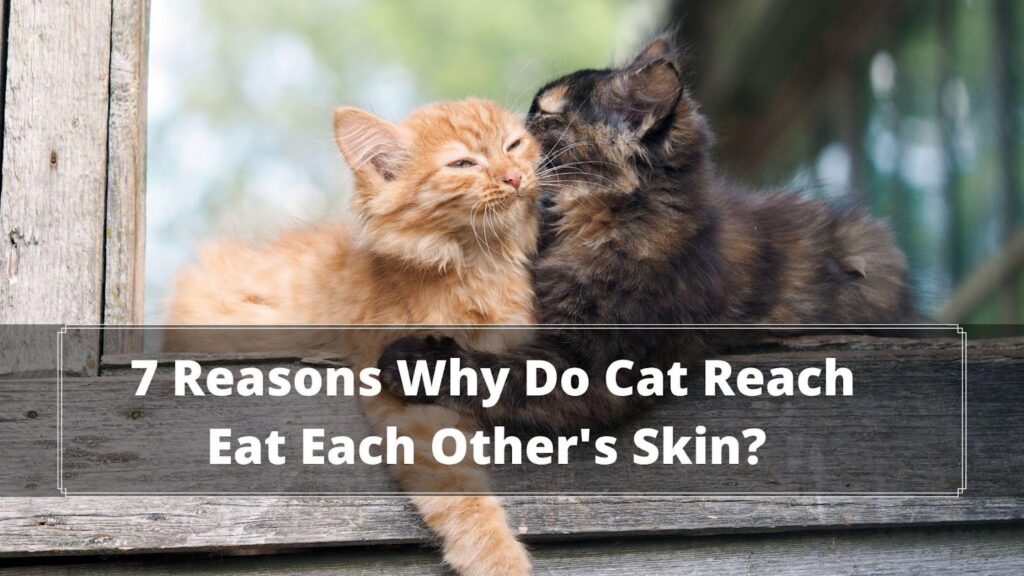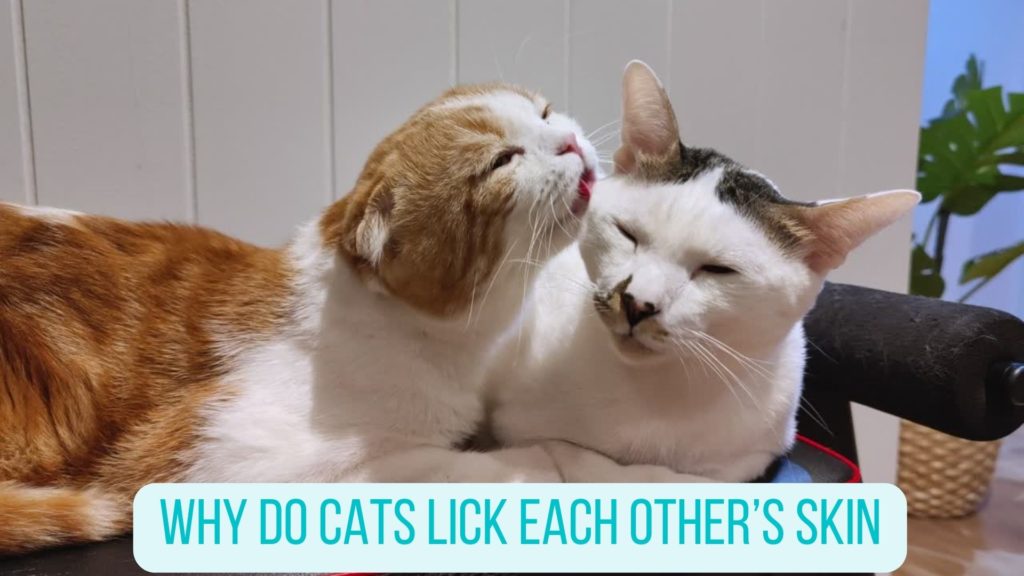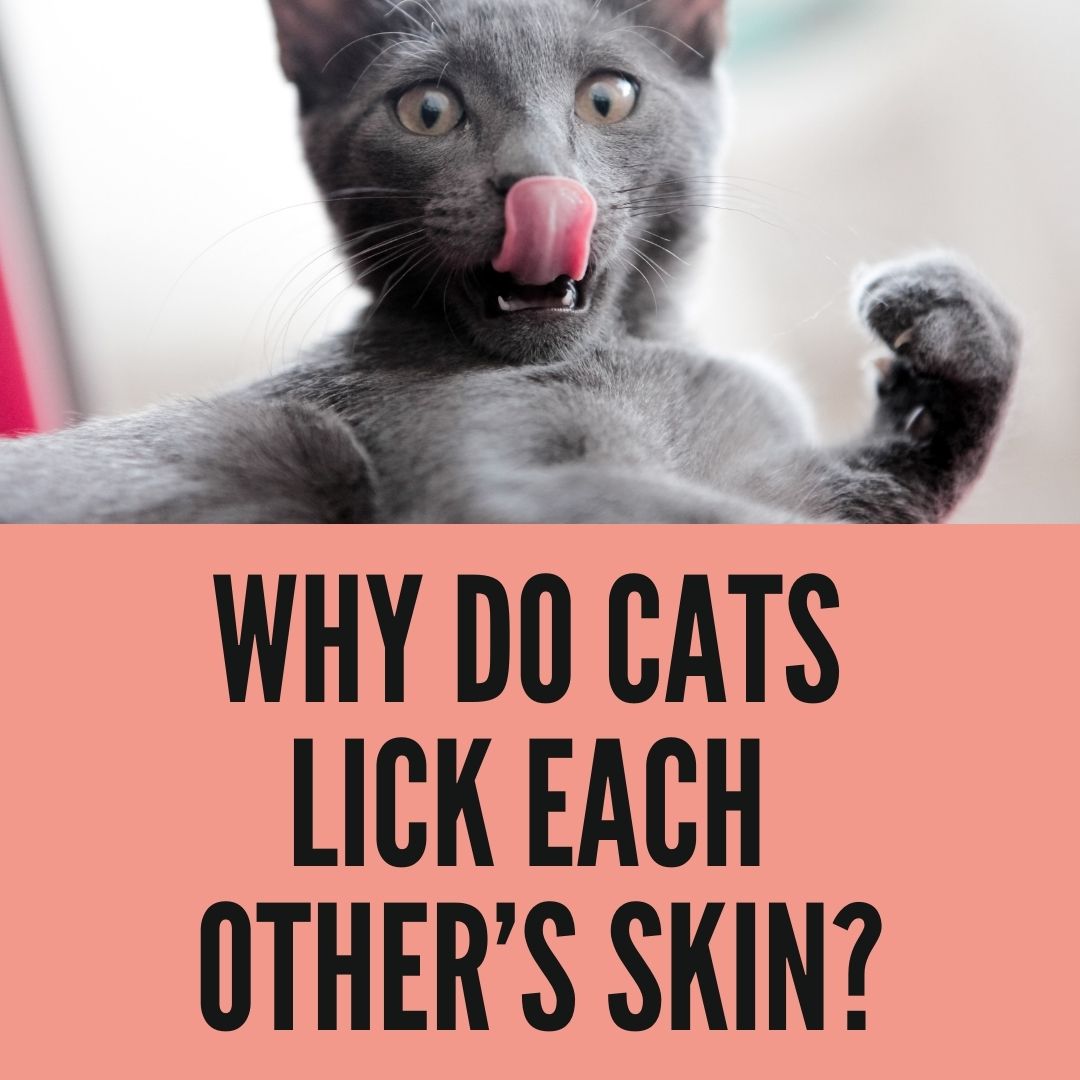We already know that pets like dogs lick each other’s skin for allogrooming, social bonding, and more. Other than this, dogs also lick their owner for whom they trust or show affection. It is one of their ways to bond. But what about cats?
Why do cats lick each other’s skin? Cats licking each other’s skin is not a sign of fighting. But it can be to make peace and play. Cats clean each other’s skin for cleanliness and allogrooming. They may also show affection or dominance over others. Unfortunately, it can also signify a health issue like stress or anxiety.
Cats are known to clean their tongues with their saliva and use it as a brush. Their language carries pointy spikes that point back towards your cat’s mouth, allowing them to groom & rake its fur: free of dander and make it shine. According to the veterinarian, cats also group themselves or each other’s skin when they need help.
Therefore, let’s talk about seven reasons cats lick each other’s skin.
Contents
7 Reasons Why Do Cat Reach Eat Each Other’s Skin?

Cats are known to lick each other skin for many reasons. Cats interact with each other through licking. If your cat is licking excessively or is obsessive, it can be due to a hidden health issue. If your cat behaves strangely or licks excessively, she could suffer from an underlying health issue. Therefore, you should take your cat to your local veterinarian as soon as possible.
In addition, cats also like to explore the world and inspect each other through mouth and nose. It is common for cats to lick a new cat to interact. Plus, You might find it embarrassing if your male cat licks other cats’ private parts. But there is nothing to worry about. This is usually a sign of dominance and affection.
Like many other behaviors in cats, licking each other’s skin is instinctual. As cats love to lick their owner to show affection, they do this with each other. It’s a natural cat instinct, but we can think of many more reasons. Therefore, let’s take a look at seven reasons why cats lick each other skin.
#1. Affection.
It is common for Cats to lick each other’s skin to show affection. When your cat considers another cat as a part of their family and feels ultimate & safe around them, she will try to interact by licking. If your cat is a part of a multi-cat household, it is common for her to lick each other’s skin throughout her life.
It makes perfect sense for a cat that loves its owner to lick. Since cats only receive and give love through licking, it shows how much they love each other.
#2. Motherly Love.
It is common to notice mother cats licking their kittens to make them feel comfortable, secure, and loved. If your cat has just given birth, she may do the same for her kitten, marking them as hers. If your cats are a part of a family or siblings or cats from a different litter, they will lick one another as a way to socially Bond.
In addition, if you notice your two cats licking each other excessively, they form a unique social bond, especially if both are of the opposite gender. The mother cat will constantly lick their kittens if they are covered in blood or appear weak. It helps the cat ensure that their kitten Smells Like just like her. It also helps them to quickly locate their baby by sniffing their skin.
#3. Habit.
Adopting a couple of kittens that were weaned prematurely or adopted too young may develop licking and sucking habits. Keeping the kittens with their mother and family for at least 12 weeks is recommended. Unfortunately, not every kitten has that option.
Some cats also get adopted in their first or second month after birth. In this case, cats might become fixated on sucking and licking objects or each other skin.
#4. Social Bonding.
Just like dogs, Cats also learn to lick their siblings or new members from another sibling as a form of social bonding. Therefore, this licking behavior can be carried over to adulthood for some kitties. Friendly cats often groom each other to show affection and love and strengthen their Bond.
Cats living in a multi-cat household or a colony often groom each other to create a familiar scent that is identical and trackable. It is a significant cat’s instinct for survival and social bonding in feline ancestry. Cats are known to locate and identify each other using scent.
If your cat is still young or has been friends for a while, this is more likely to occur. If you bring a new cat home, the older one might also give it a quick lick as a part of social bonding or inspection. Cats and dogs, including many species, have evolved to form a social bonding and dominance and show affection through licking and sniffing.
#5. Dominance.
Another reason your cat might be licking another one is to form dominance. Always remember your cats are not always as innocent as they seem. They may lick each other to establish dominance. It is easy to notice a pattern when your cats lick each other. If only one of your cats is licking or doing most of their grooming, it is likely to be the one who is dominating. Male cats of feline ancestry usually initiate it. In addition, most cat grooming is unidirectional, meaning only one cat will lick the other.
#6. Health Issue.
A cat might be suffering from any health issue physically or emotionally. Anxiety or depression might also cause the pet to suffer from licking behavior. Licking is a way for cats to relieve stress. If a cat is anxious, she might be prone to licking other cat skin or objects.
Some cats also overgroom to the point where their bald patches appear. If your cat is in pain, she might also overlick it. According to many veterinarians, if your cat is licking excessively, you should report to your nearest veterinarian to address it adequately. It is essential to do a proper checkup and rule out any medical reasons.
If a cat is healthy, your veterinarian will give it a green signal and then refer you to a certified cat behavior expert, only if they cannot find the cause. If one of your CAT appears to be sick, the other will lick it. Cats suffering from injuries or wounds lick excessively on objects or other cats. It is advised to consult a veterinarian if your cat is receiving excessive licks or looks unwell.
There could be an underlying kidney disease or something more severe like a flea infestation. As I said, anxious and stressed-out cats often lick each other’s skin or objects. So it’s worth looking at their surroundings to rule out things that might be causing the anxiety.
#7. Allogrooming.
Cats are known to do their grooming themselves very effectively. And, as your cat’s tongue is already designed to groom themselves, they are also capable of removing knots and mats from their coat. If one cat needs help with grooming, one or more cats will lick on its heads and ears.
It is more common in older cats. Cats over 9-10 years old find it hard to reach some areas using their tongue to self-groom. This is where young cats come to help, especially when they live in a multi-cat household. Let’s talk about how to deal with cats residing with each other’s skin.
What To Do About Cats Licking Each Other’s Skin?

Firstly, all people will find cats licking each other’s skin as an endearing and adorable moment. Their tongues might be rough, irritating, or uncomfortable sometimes to you. But it is a part of allogrooming in multi-cat households. It would help if you never punish your cat for doing this.
Instead, you can distract your cat in a positive or fun way to maintain a social bond. Throw a toy like a chewable ball or an interactive toy. If you want to eliminate this behaviour, you might need advice from a certified cat behaviour specialist.
If you notice your cat licking excessively over objects, each other’s skin, or you, take her to your nearest veterinarian for a quick checkup. It is essential to protect your cats and cat-proof your house. Cats want to get to know each other better or to form a familiar scent when they lick each other’s skin.

Conclusion
If you notice your cat licking each other skin, then don’t be shocked or alarmed. Although it may seem strange to you, it is an Instinct. Your cat is licking each other’s skin to show friendliness, dominance, and affection. It doesn’t matter what is causing them to lick each other’s skin as long as there is no sign of health issues.
If your cat licks on objects or furniture, she may need medical help. All in all, cats licking each other’s skin is neither bad nor means any harm. It’s a cute behavior in cats living in multiple pet households. I tried my best to give you all the reasons why cats lick each other’s skin.
If you find this article helpful, then please consider sharing it. Your one share can help many people understand their cat’s behavior. Sharing is caring. Check out our other cat care articles; till then, take care and goodbye.
For Further Reading
